Organic sweet potatoes certainly catch the eye of the health-conscience consumer looking for the best starch to add to their diet. They’re a great source of vitamins A, B-6 and C, as well as fiber, calcium, iron and magnesium. California is the fourth largest sweet potato producer with approximately 21,000 acres harvested in 2018, however, they are the leader for organic sweet potato production. According to the USDA Certified Organic Survey, California sold $101 million worth of organic sweet potatoes in 2016. California’s climate is a much more suitable environment for organic vegetable production and has much less pest and disease pressure than Florida. However, the market opportunities for local organic sweet potato production certainly exist in Florida. Though it may be an uphill battle, the UF/IFAS Hastings Agriculture Extension Center is conducting a trial on organic sweet potatoes. With the tremendous help of the tireless Hastings staff, the trial was planted on July 1, 2019.

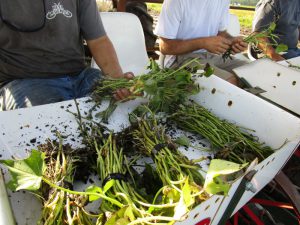
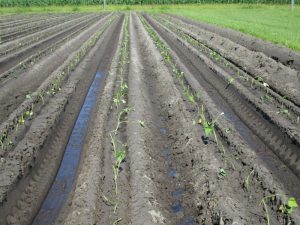
Dr. Wendy Mussoline is the Principal Investigator of this trial funded by St. Johns County and she is partnering with Dr. Janice Bohac who has been breeding sweet potatoes formerly with USDA and currently with CAREnergy https://www.carenergyinfo.com/ for the last 30 years. Dr. Bohac has developed several new sweet potato varieties that are being grown organically in California. She has shared some of her specialty cultivars with the UF/IFAS Hastings Agriculture Extension Center for research purposes. The unique cultivars in the organic trial include the Charleston Purple, the New Boniato (or Charleston 14-166), and the Charleston Scarlett. The Scarlett is a traditional orange-fleshed sweet potato but the orange hue is much deeper than a typical “Beauregard” or “Covington” that are commonly sold in grocery stores. The Scarlett is very moist, sweet and packed with flavor. The Charleston Purple (aka Violet Queen) is the popular purple-flesh variety grown by a few local potato growers such as Blue Sky Farms and Singleton and Sons. It’s deep purple hue is indicative of its anthocyanin content which is a phytochemical primarily responsible for human health maintenance. The New Boniato has a dry, cream-colored flesh that only bares a hint of sweetness and is common in Cuban cuisine.
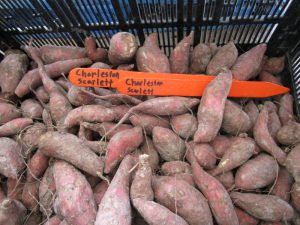
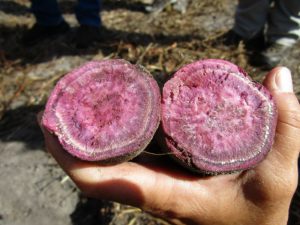
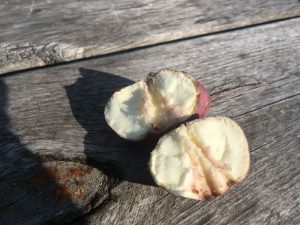
These three unique varieties are growing next to the “Covington” variety, which will serve as a baseline to see if they can persist among the pests inherently present within our Florida climate without using conventional pesticides. Weeds are certainly one of our biggest “pests” in Florida, but sweet potatoes have a dense canopy that can easily outcompete weeds upon establishment. Hand-weeding or mechanical raking may be necessary for the first six weeks and then the healthy stand can usually hold its own against the weeds. A major challenge with organic production in Hastings involves plant-parasitic nematodes. They are tiny roundworms that attack root systems of plants, which leads to damaged roots and reduced crop yields. UF/IFAS EDIS document by Dr. Zane Grabau will give you a wealth of info on nematodes that affect potatoes if you are interested https://edis.ifas.ufl.edu/ng029
Potato growers in Hastings use chemical fumigation prior to planting potatoes to overcome the devastating impacts of plant-parasitic nematodes. Conventional sweet potato growers also fumigate their soils prior to planting this crop. However, with organic production this technique is not allowed and so alternatives such as genetic selection of cultivars with potential nematode resistance is necessary. Although not proven, the breeder believes that Charleston Scarlett has some natural resistance to nematodes. Therefore, as part of this trial, we are identifying and quantifying every type of nematode in the soil for each cultivar throughout the growing season. We hope to prove that some of these specialty varieties, particularly Charleston Scarlett, demonstrate nematode resistance in our Florida soils. Results from this trial will be presented at the Cole Crop Field Day scheduled for December 12, 2019. Please email me (wmussoli@ufl.edu ) if you are interested in attending.
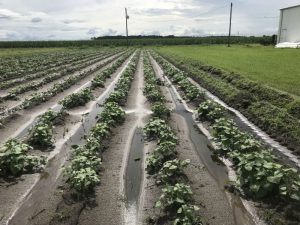
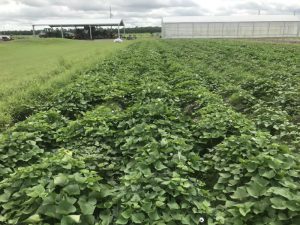
 0
0
